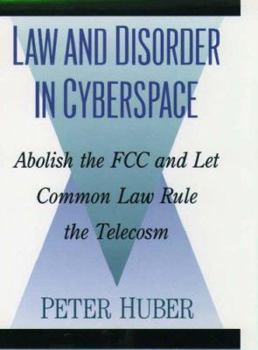Law and Disorder in Cyberspace
When the U.S. Congress created the Federal Radio Commission in 1927, what we now call cyberspace was just "ether." Broadcasting had only begun to carry tinny human voices and music across the fields and prairies, while Sunday afternoon phone calls to Aunt Mabel snaked through wires below, courtesy of an army of operators who switched each circuit by hand. It didn't take long, though, for the wires and airwaves to fill up with untrammeled chatter,...
Format:Hardcover
Language:English
ISBN:0195116143
ISBN13:9780195116144
Release Date:October 1997
Publisher:Oxford University Press, USA
Length:288 Pages
Weight:1.23 lbs.
Dimensions:1.2" x 9.3" x 6.2"
Customer Reviews
2 ratings
Thoughtful, Provocative Look at Telecom Regulation
Published by Thriftbooks.com User , 15 years ago
A dozen years after its publication, Peter Huber's "Law and Disorder in Cyberspace" remains relevant and as insightful as when it was first released. The book takes the reader on a quick trip through federal regulation of telephone, broadcast, and cable. It's no warm, fuzzy tale. Huber's retelling of how regulations stifled investment, chilled innovation, and delayed deployment in new media and communications technologies is positively cringe-inducing. The saga runs from the federal government's first forays in broadcast licensing on down to the demise of the "fairness doctrine" in broadcast regulation. There is a run-down of the federal monopoly regulatory regime for telephone service, from Carterfone and Hush-a-Phone, to the Computer Inquiry rules, on to the consent decree in Judge Harold Greene's Court. (Importantly, this book takes into account the Telecommunications Act of 1996, which brought an end to the decree.) A tour of cable regulation shows how that disruptive technology disrupted pre-existing regulatory models--though that didn't stop regulators from asserting jurisdiction over it in order to protect broadcasting. A larger take on regulation also comes into view in this book. One theme to emerge is the unfortunate imposition of pre-existing regulatory categories (designed for older technologies) on newer technologies. Another is the extent to which public officials went out of their way to protect "free" ad-supported broadcasting or local broadcasting from competing technologies and offerings. What still stands out most in "Law and Disorder in Cyberspace" is the book's provocative thesis: the Federal Communications Commission (FCC) should be abolished and "telecosm" regulation should be replaced by common law. Huber looks to the bottom-up method of incremental, distributed, ex post decision-making that characterizes the common law as a superior way to unleash the forces of competition and innovation. After Huber's grim history of telecommunications regulation, the contrasting top-down, centralized, ex ante approach of a federal regulatory commission certainly looks less attractive. As a practical, political matter, abolition of the FCC seems unrealistic, perhaps far-fetched. Regardless, Huber's underlying insights are still worth pondering. Since the main text of the book concludes at page 206, this isn't a long treatise meant to explain every detail. For instance, Huber mentions in passing that the "essential facilities" doctrine has served fairly well. Even one sympathetic to Huber's arguments and to a consumer welfare-driven antitrust outlook may be left wondering what that means. (The U.S. Supreme Court has since cast serious doubt on the "essential facilities" doctrine.) Along the way, Huber professes his concerns about the Telecom Act of '96's unbundling mandates in wireline--and was ultimately proven right. He takes wireless a lot more seriously than public officials who put together the Telecom
Abolish the FCC?
Published by Thriftbooks.com User , 21 years ago
On the recommendation of a good friend, I read this book to bone up for my internship at the FCC. Peter Huber presents a good history of the FCC, and why it never should have existed. His thesis is simple and compelling: of all things, communications technology doesn't need top-down regulation, but rather the evolutionary flexibility of the common law.He has a point. Look at the success of an open standard like Wi-Fi. Allow that slice of the spectrum to be free and the free-market will add value to it. But hey, the FCC ain't going nowhere any time soon. The best we can hope for is as much un- and deregulation as possible.I recommend this very well researched and passionately written book!





